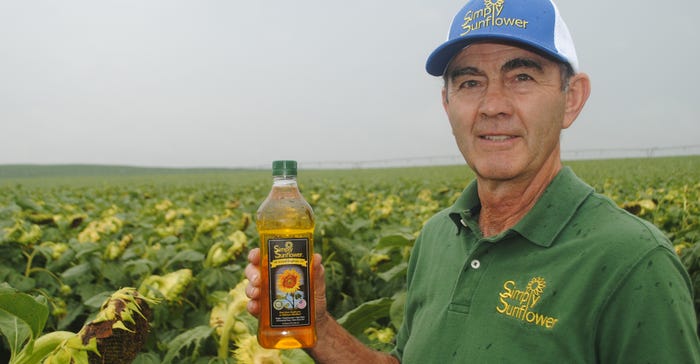
Sunflower-planted acreage in Nebraska fluctuates year to year, but in 2021, about 46,000 acres were planted to oil and non-oil varieties across the state. That’s a little lower than in 2020. While much of the sunflower acreage and research is confined to the western part of the state, there are sunflowers growing in all regions.
Valley County around Ord and North Loup is not considered ground central for sunflower production in the state. However, Alan Koelling and his family have been growing flowers successfully for a dozen years on land south of Ord that has been in the family for nearly 120 years.
Koelling graduated from the University of Nebraska with majors in animal science and ag education. Back on the farm, he has not shied away from trying new things and working to develop value-added enterprises, coupled with sound soil and land stewardship practices.
Sometimes, an original plan for a new enterprise works out, and other times, it can evolve into something different. Koelling’s original plan to add value to his sunflower crop was to make biodiesel out of the sunflower oil that he could use on his own farm, and perhaps sell to others. As with all farm enterprises, this initial endeavor evolved into the production, processing, packaging and marketing of something quite different — healthful sunflower cooking oil for human consumption.
Cooking with oil
Today, all of the Koelling family’s 225 acres of sunflowers go to produce their own Simply Sunflower brand of cooking oil, which is processed and packaged at a plant in nearby North Loup. They have experimented with sunflower oil in biodiesel, but offering it as a consumer-packaged product has been the most successful enterprise. It is marketed to both grocery stores and as an ingredient to soap and cosmetic companies.
The cooking oil is now sold in more than 350 retail stores, mostly clustered in Nebraska, Iowa, Texas and California, but the distribution list is growing rapidly by the day.
Nebraska Farmer visited Koelling on the farm near Ord and walked the irrigated sunflower fields that produce Simply Sunflower oil. Koelling says that extensive testing has proven the family’s sunflower oil to be extremely high in vitamin E, antioxidants and beneficial fats. And the product is cholesterol and transfat free.
The success of their sunflower cooking oil did not come easy or fast. It took years to evolve and a purposeful business plan, along with substantial testing and trial and error to get where they are today. “We raise corn, soybeans, sunflowers and can include wheat in a crop rotation,” Koelling explains. “Sunflowers help to break up any hardpan in our soils from many years ago.”
The flowers are raised under no-till and under irrigation and dryland conditions. The center pivot irrigation is particularly helpful on about half of his sunflower fields that are double-cropped after wheat harvest. Koelling usually plants no-till sunflowers into his wheat stubble by July 10.
The double-cropping with sunflowers helps to naturally break up insect and weed cycles on the land, Koelling says. “We raise a good wheat crop, just using 2,4-D to control the weeds in the wheat. Weed problems can vary, but we get good control on lambsquarter and acceptable control on Palmer amaranth.”
Sunflowers planted after wheat remain clean from most weeds and might yield up to 70% of a normal single-cropped field, so the economics works out. The sunflowers are typically harvested at moisture levels of up to 15%, which is a little higher than normal for sunflowers, but they have the capability to air-dry the crop.
The earlier harvesttime protects the crop from lodging during harvest and also lowers the risk of combine fires, which are more frequent in sunflower fields because of the high oil content of the crop and low humidity levels during traditional harvest.
Good stewards
Koelling is also deeply concerned about the environment, and pollinators in particular, which are beneficial in sunflower production. That’s why the family hosted 32 beehives this year on their land, which amounts to nearly 1.2 million bees, and it is also why they do not use insecticides on their crop ground.
While working on the original biodiesel plan for the sunflowers, Koelling learned plenty about how to develop a business model for the enterprise, how to expel the oil and make the alternative fuel.
But there were logistical obstacles to getting into the biofuels market. Transportation costs to markets and processing plants seemed prohibitive when considering marketing commodity oil sunflowers into the wild birdseed market.
Out of these challenges came the sunflower cooking oil concept. When the family began developing their cooking oil, they initially hired out their packaging. However, they quickly learned the benefits of being peanut-free, which their co-packer could not provide.
This led them to develop their own processing plant, where only their own home-raised sunflower oil was being processed and packaged, to guarantee the “peanut-free” label to their customers to protect those who are allergic to peanuts and to offer a specialized niche within the market, Koelling says.
Get the word out
The family has attended large food shows in Anaheim, Calif., and participates in more regionally based marketing platforms such as Grow Nebraska, in order to get their product out into the marketplace.
Perhaps the culmination of their work takes place each summer when the beautiful sunflower fields are in full bloom in mid-August, and the family hosts friends, neighbors and customers for a sunflower field day, which includes tours and plenty of opportunity for photos in the fields.
The Simply Sunflower cooking oil idea isn’t exactly the same plan that Koelling and his family embarked on when they looked initially at adding value to their sunflower crop. Yet, it is heartening for the family to be producing a healthful human food, and their growth and rapid expansion over the past few years is proof that their new plan is working just fine.
Learn more online at simplysunflower.com.
About the Author(s)
You May Also Like






